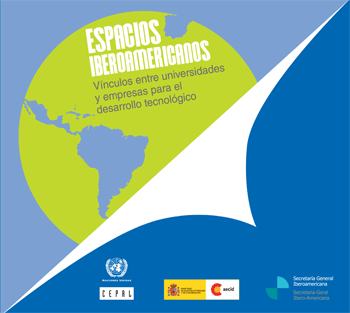Strengthening Links Between Universities and the Production Sector Is Vital for Building More Inclusive Societies
Document was presented at the 6th Ibero-American Business Meeting held in Argentina.

(3 December 2010) Investment in research and development (R&D) in Ibero-America represents just over 5% of the world total and is concentrated in a handful of countries. Strengthening these activities is essential for productive development with innovation and more social inclusion, as pointed out in the new joint report by ECLAC and the Ibero-American Secretariat (SEGIB) presented today.
Ibero-American Spaces. Links between universities and businesses for technological development was presented by ECLAC at the 6th Ibero-American Business Meeting, which is being held alongside the 20th Ibero-American Summit of Heads of State and Government
in Mar del Plata, Argentina.
The joint publication emphasizes the need to strengthen links between universities and businesses, as higher research institutes are the main generators of knowledge in the region, which is why a more fluid exchange would promote the formulation of innovation policies to drive forward the technological development of countries.
"It is only through cooperation among the agents in national innovation systems (universities, research centres, businesses and State institutions) that progress can be made towards building more inclusive and integrated societies", as stated by the Executive Secretary of ECLAC, Alicia Bárcena, and Ibero-American Secretary-General, Enrique Iglesias, in the preface to the document.
According to the study, total R&D spending in Ibero-America more than doubled between 2000 and 2008 to reach US$ 17.835 billion. However, 80% of this is concentrated in just four countries: Brazil, Mexico, Portugal and Spain, and overall this investment remains low compared with other world regions.
ECLAC and SEGIB identify a series of challenges and opportunities for promoting links between universities and businesses. First, scientific and technological capacities should be strengthened by means of increased investment in R&D, in the public and private sectors alike.
Second, Ibero-American universities must improve the quantity and quality of their scientific publications and broaden applied research, while the region's production sector should seek to specialize with increased technological intensity and to boost investment and participation in R&D activities.
It is also vital to strengthen institutional infrastructure (national research systems, intermediaries, complex systems of interrelations) and to develop more integrated policies as a top priority.
Lastly, there is a proposal to formulate indicators to measure the scope and impact of the relationship between universities and businesses, as well as to identify joint cooperation projects or activities among the region's various institutions.
At the 20th Ibero-American Summit of Heads of State and Government, the Executive Secretary of ECLAC also submitted to leaders the document Educational Goals for 2021: the education we want for the bicentennial generation, produced by ECLAC and the Organization of Ibero-American States for Education, Science and Culture (OEI), in close collaboration with the Ibero-American Secretariat (SEGIB).
The document presents a series of ambitious objectives for improving quality and equity in education and tackling poverty and inequality as a means of promoting social inclusion.
As part of the Summit, Alicia Bárcena participated in the main discussions of the 6th Ibero-American Business Meeting, along with renowned economists and academics including José Antonio Ocampo, Aldo Ferrer, Rose Mary Thorp and Juan Ruiz. She presented an economic and social overview of the region for the past decade and reaffirmed the central ideas of the document Time for equality: closing gaps, opening trails, which was launched by ECLAC this year at its session.
Ms. Bárcena then attended the first Ibero-American Union Meeting, where she spoke as part of the panel on "The global financial crisis: impact on workers and employment". She restated ECLAC's commitment to equality based on rights, particularly union and labour rights, such as collective bargaining.
During her trip to Argentina, Alicia Bárcena was invited by the country's President, Cristina Fernández, to the inauguration of a mural by the Mexican artist David Siqueiros at the Casa Rosada presidential palace, which was also attended by the Mexican President, Felipe Calderón. Ms. Bárcena also attended the launch of the following book by the President of Ecuador, Rafael Correa, "Ecuador: from Banana Republic to No Republic".
For queries, please contact the ECLAC Public Information and Web Services Section. E-mail: dpisantiago@cepal.org;
telephone: (56 2) 210 2040. ECLAC (Av. Dag Hammarskjold 3477, Vitacura, Santiago).
Country(ies)
- Latin America and the Caribbean
Contact
Public Information Unit
- prensa@cepal.org
- (56 2) 2210 2040